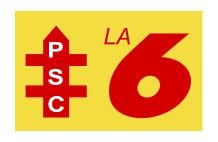Social Christian Party (Ecuador)
Social Christian Party | |
|---|---|
 | |
| President | Pascual del Cioppo |
| Founder |
Camilo Ponce Enríquez Sixto Durán Ballén |
| Founded | 1951 |
| Ideology |
Christian democracy Conservatism |
| Political position | Centre-right |
| International affiliation | International Democrat Union |
| Regional affiliation | Union of Latin American Parties |
| Colors | Gold, red |
| Seats in the National Assembly |
6 / 137 |
| Website | |
| http://www.la6.ec/ | |
The Social Christian Party (Spanish: Partido Social Cristiano; PSC) is a center-right political party in Ecuador.
The party was founded in 1951 under the name of Social Christian Movement (Movimiento Social Cristiano) by Camilo Ponce Enríquez, who was Ecuador's president from 1956 to 1960, and Sixto Durán Ballén. It was initially focused on Quito. Since the 1980s, however, the party's popularity is greatest on the coastal areas, particularly around Ecuador's economic center and most populous city, Guayaquil, and in coastal provinces, such as Guayas, El Oro, Los Rios, and Manabi, which constitute about half of the country's population. However, as a sign of deep regional divide on politics, the party has little power in the Andean region. Thus, while holding all major positions in Guayas and Guayaquil, the PSC has not held the presidential office since the presidency of León Febres Cordero (1984–88).
In 1979, the party's centrist and leftist wing split off to form the centre-left Popular Democracy party under Osvaldo Hurtado, who was the country's president from 1981 to 1984. After Febres' faction inside the PSC succeeded in appointing Jaime Nebot as the party's presidential candidate, Sixto Durán Ballén and his supporters left the party to form the more right-wing Republican Union.[1] Eventually, Durán was elected president for the period 1992–1996. Nebot was the party's presidential candidate again in 1996. He won first place in the first round with 28% of the vote, but lost in the runoff with 46% of the vote to Abdalá Bucaram.
The PSC candidate, Xavier Neira, won 12.2 percent of the vote in the 2002 presidential election. Its candidate in the 2006 presidential election was Cynthia Viteri. She garnered 9.91 percent of the overall votes cast and failed to enter into the second round of runoff voting. Neira and Viteri both came in 5th place. At the 2006 legislative elections, the party won 13 of the 100 seats, much less than last period.
After León Febres Cordero's death, Jaime Nebot took over the leadership of the party, and split it into a coalition with his provincial brother party called "Madera de Guerrero", an allusion to a song of the folklore of Guayaquil with the same name. This coalition is the third force in the National Assembly (parliament).
External links
References
- ↑ Morrisson, Christian (ed.) (1994), The Political Feasibility of Adjustment in Ecuador and Venezuela, OECD Publications Centre, p. 44